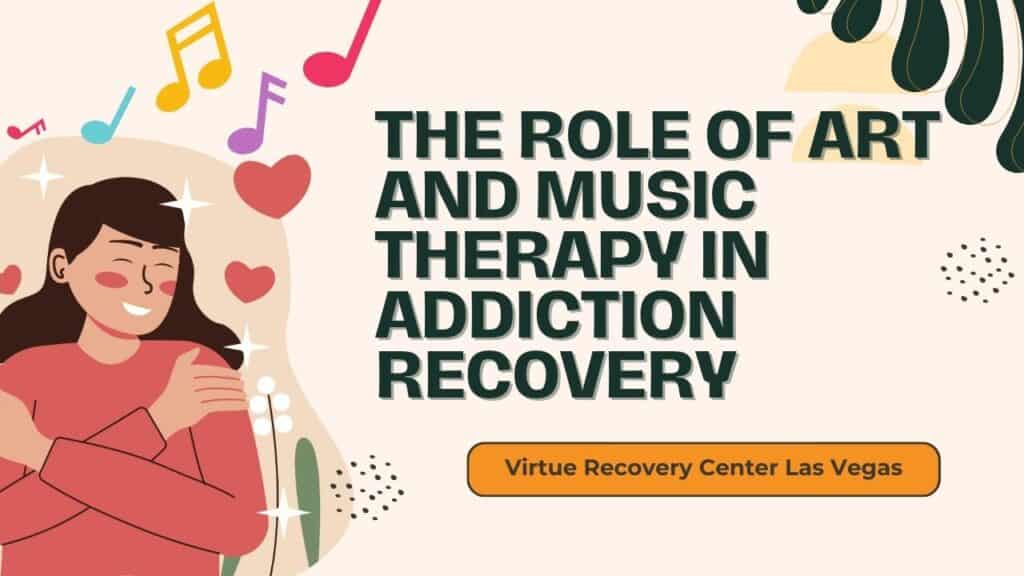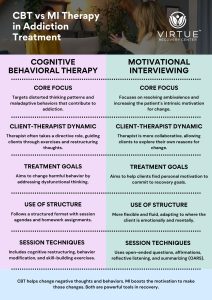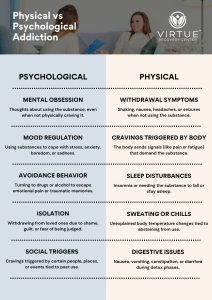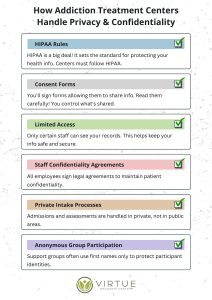In the heart of Las Vegas, where the hustle of the Strip buzzes in stark contrast to the plight of those battling addiction, innovative therapeutic avenues such as art and music therapy are carving out a transformative path for healing. Pioneering centers dedicated to addiction recovery in this city have embraced these creative modalities as more than mere pastimes; they’re integral parts of a comprehensive treatment strategy. Through the mediums of melodies and brushstrokes, those on the journey to sobriety tap into the rich wellsprings of their inner lives.
Renowned for its vibrant art scene and entertainment, Las Vegas offers a unique backdrop for therapies that merge the transformative power of creativity with traditional rehab programs. Art therapy in addiction and music therapy for substance abuse provide patients with alternative means to communicate, confront, and conquer the emotional upheavals that often accompany the road to recovery. Far from the cacophony of casino slots, individuals find solace and expression in the rhythmic reassurance of a drum beat or the silent eloquence of a painted canvas.
Key Takeaways
- Art and music therapy are vital components of a holistic approach to addiction recovery in Las Vegas.
- These therapies offer therapeutic benefits that complement traditional treatment methods, promoting emotional healing.
- Creative arts therapies have proven effectiveness in helping patients manage the complexities of substance abuse recovery.
- Las Vegas’s unique fusion of art, music, and therapeutic care creates a rich landscape for personal growth and rehabilitation.
- Recovery centers like Virtue Recovery Center highlight the city’s commitment to innovative and effective addiction treatment options.
Understanding the Foundations of Art and Music Therapy
The profound impact of art and music therapy on mental health is rooted in a rich history, where self-expression through creative mediums has evolved into an essential component of addiction recovery. These therapies not only offer alternative ways to communicate emotions but also actively promote healing, proving their worth in the realm of rehabilitation.
Historical Perspectives of Creative Therapies in Mental Health
Long before art and music became structured modalities in mental health treatment, they were innate forms of human expression. With the historical perspectives of art therapy establishing it in the 1950s as a significant therapeutic approach, today it stands as a testament to the enduring power of creativity in healing the mind and spirit. Similarly, music therapy has transcended cultural and temporal boundaries, fortifying its position as a dynamic force in therapeutic practices.
From Canvas to Recovery: How Art Therapy Facilitates Healing
- Building Self-Esteem: Through mastering art therapy techniques, patients cultivate a stronger sense of self-worth.
- Encouraging Emotional Articulation: By drawing emotions or stress painting, individuals find a non-verbal language for their feelings.
- Fostering Strategic Thinking: The act of creating, whether through sculpting or maintaining art journals, sharpens the mind.
The myriad of benefits of art therapy in addiction recovery are manifested as patients engage in these activities, each designed to promote personal growth and long-term sobriety.
Harmonizing the Mind: Music Therapy in Addiction Recovery
- Analyzing Lyrics: A technique to delve into messages that resonate with the patients’ experiences.
- Improvising Music: Engaging creatively to foster spontaneous emotional expression.
- Rhythmic Relaxation: Using drumming circles or other music therapy activities as a form of mediation and stress relief.
With an orchestra of interventions, music therapy techniques serve as a bridge to understanding and processing complex emotions, thus harmonizing recovery with music therapy and charting a course toward wellness.
Music Therapy in Addiction Recovery
The transformative power of music therapy in addressing the complexities of addiction has been increasingly recognized, with a growing number of music therapy programs finding their place within the mantle of comprehensive addiction treatment. By integrating music therapy in addiction treatment, healthcare practitioners are providing a unique outlet for patients to begin their journey towards healing and wholeness.
Central to the role of music therapy in recovery is its flexibility to be tailored to the personal therapeutic needs of every individual. Sessions may range from the deeply personal—wherein clients express their emotions through composing and songwriting—to the more communal, such as participating in a drum circle or choir. These activities not only foster a spirit of unity and mutual support but also help in the reconstruction of one’s self-identity beyond addiction.
- Listening to soothing melodies to calm the mind and alleviate stress.
- Playing instruments to encourage a sense of achievement and improve motor skills.
- Singing as a form of expressive therapy to enhance respiratory and speech functions.
- Movement to music, which promotes physical coordination and provides an emotional release.
Moreover, the therapeutic landscape of music therapy extends to its profound benefits for individuals grappling with Post-traumatic Stress Disorder (PTSD), reinforcing its invaluable role in promoting overall wellness. In these scenarios, music acts as a medium to navigate through traumatic memories in a non-verbal manner, potentially reducing the impact of triggers and facilitating a more grounded existence.
In conclusion, as we further our understanding of the intricate web of addiction, therapies that incorporate the arts, such as music, become essential allies in the treatment arsenal. By working in concert with other treatment modalities, music therapy bolsters resilience, nurtures hope, and orchestrates a more harmonious path to lasting recovery.
Integrating Art and Music into Las Vegas Rehabilitation Programs
As the fight against addiction evolves, treatment centers like Virtue Recovery Center Las Vegas are pioneering a holistic approach to addiction recovery. Recognizing the individual’s journey through recovery requires a multi-dimensional strategy; these centers are weaving a tapestry of traditional and progressive therapies.
Virtue Recovery Center’s Approach to Holistic Healing
At Virtue Recovery Center, the credence that healing must be all-encompassing underpins their programs. A solid foundation of medical treatment is enriched with the expressive power of art and music, forging a strong alliance in the patient’s battle against addiction. The synergy of these modalities promotes a holistic healing experience that nurtures both the body and soul.
Complementary Techniques: Blending Traditional and Expressive Therapies
Art and music therapy are not stand-alone treats at these havens of recuperation. Instead, they are complementary techniques in recovery, meticulously paired with evidence-based practices like cognitive behavioral therapy and pharmacotherapy. This rich blend creates a personalized healing milieu that addresses the myriad challenges faced by those on the road to recovery.
Case Studies: Success Stories from the Las Vegas Community
Las Vegas has borne witness to the transformative power of merging art and music therapy success stories with conventional treatments. Case studies in the community showcase remarkable progress in self-regulation and mental health, thus endorsing the use of expressive therapies for meaningful and sustained recovery success.
- Increased emotional resilience
- Enhanced stress management techniques
- Greater behavioral control
- Deeper connection to personal identity and community
These narratives reinforce the value of integrating diverse therapeutic approaches to create a fuller spectrum of care that fosters lasting recovery.
Evaluating the Benefits and Challenges of Creative Therapies
The integration of evidence-based music therapy into recovery programs has shown significant success in addressing mental health conditions and Substance Use Disorders (SUD). Participants in these programs often experience a range of psychological benefits, from enhanced self-esteem to profound emotional changes. Despite their potential, creative therapies must navigate an array of challenges to maximize their impact in the rehabilitation landscape.
Benefits of Evidence-Based Music Therapy:
- Promotes emotional growth and self-awareness
- Fosters improved self-esteem through skill acquisition
- Facilitates positive emotional change and mood regulation
- Enhances coping strategies for stress and anxiety
- Supports substance abuse recovery by offering a non-verbal outlet for expression
Challenges of Music Therapy in Recovery:
- Individual Acceptance: Varying degrees of reception among clients, as some may be more receptive to creative modalities than others.
- Qualified Therapists: The necessity to find and retain therapists who are both skilled and experienced in therapeutic artistic disciplines.
- Treatment Alignment: Ensuring that the therapy’s methodology coincides with the patient’s specific treatment objectives and therapeutic needs.
By highlighting and addressing these challenges, practitioners can better tailor music therapy interventions to serve as a powerful tool in the journey towards recovery, acknowledging its place as one of the many valuable approaches in the treatment of mental health disorders and addiction.
Accessing Art and Music Therapy Resources in Las Vegas
For those embarking on a journey to overcome substance abuse, Las Vegas rehab resources offer a multitude of options for incorporating art and music therapy into treatment plans. Engaging in art therapy can act as a powerful outlet for self-expression and emotional catharsis, while music therapy programs provide a harmonious path to recovery, addressing emotional and psychological healing through sound and rhythm. Navigating the wealth of available services begins with a simple yet vital step—reaching out to healthcare providers.
Consultation with a primary care physician or an addiction specialist can pave the way for accessing art therapy and finding fitting music therapy programs tailored to individual needs. Whether it’s an immersive inpatient program or a flexible outpatient setting, the integration of creative therapies is customized to resonate with one’s personal healing process. It is through this individualized approach that art and music therapies effectively enhance the standard regimens of addiction treatment.
Additionally, resources like the directory from recovery.org and guidance from organizations such as the American Addiction Centers play instrumental roles in connecting individuals to appropriate sources of support. These resources help in pinpointing the right therapy program while also addressing practical considerations, such as insurance coverage. It’s essential to explore and analyze these options collaboratively with professionals to ensure that the chosen modalities align seamlessly with one’s path to recovery.
FAQ
Q: What is the role of art and music therapy in addiction recovery?
A: Art and music therapy play a crucial role in addiction recovery by providing therapeutic services that assist individuals in addressing their specific needs, reducing symptoms of depression, and building positive relationships.
Q: What are some examples of music therapy services?
A: Music therapy services may include dynamic music therapy, adaptive music lessons, music groups, making music, listening to music, and utilizing music experiences to address the emotional and developmental needs of individuals.
Q: How can a music therapist assist in addiction recovery?
A: A music therapist can utilize music therapy techniques to help individuals express and process their emotions, develop positive coping skills, and address the unique challenges they face in recovery.
Q: What specific skills and qualifications does a music therapist need?
A: A music therapist needs to be licensed to practice in the state of Nevada, hold a degree in music therapy, be certified as a music therapist, and have the ability to work with individuals with different abilities and age groups.
Q: Is art and music therapy only suitable for adults in addiction recovery?
A: No, art and music therapy can be tailored to address the needs of individuals of all ages, including children, adolescents, and adults who are in addiction recovery.
Q: How are art and music therapy integrated into addiction recovery programs?
A: Art and music therapy may also be combined with traditional counseling, support groups, and other therapeutic services to create a holistic approach that addresses the emotional and psychological aspects of addiction recovery.
Q: What are the potential benefits of participating in music therapy sessions?
A: Participating in music therapy sessions can lead to improved communication skills, emotional expression, academic and developmental progress, as well as a sense of happiness and well-being for individuals in addiction recovery.
Q: Can individuals with special needs participate in art and music therapy?
A: Yes, art and music therapy programs are designed to be accessible and adaptable for individuals with special needs, including those with developmental disabilities or different abilities.
Q: How long are typical art and music therapy sessions?
A: Art and music therapy sessions are typically 50 minutes long and may be tailored to the specific needs and interests of the individuals participating in the therapy.
How Can Art and Music Therapy Support Sober Living in a City like Las Vegas?
Art and music therapy can be incredibly beneficial for those navigating sober living in a party city like Las Vegas. Engaging in these creative activities can provide a healthy outlet for emotions and stress, and offer a sense of purpose and fulfillment without relying on substances to have fun.
Q: Where can I find art and music therapy services in Las Vegas?
A: Art and music therapy services are available in Virtue Recovery Center Las Vegas through licensed and certified music therapists and facilities that specialize in providing therapeutic services for addiction recovery and other specific needs.













